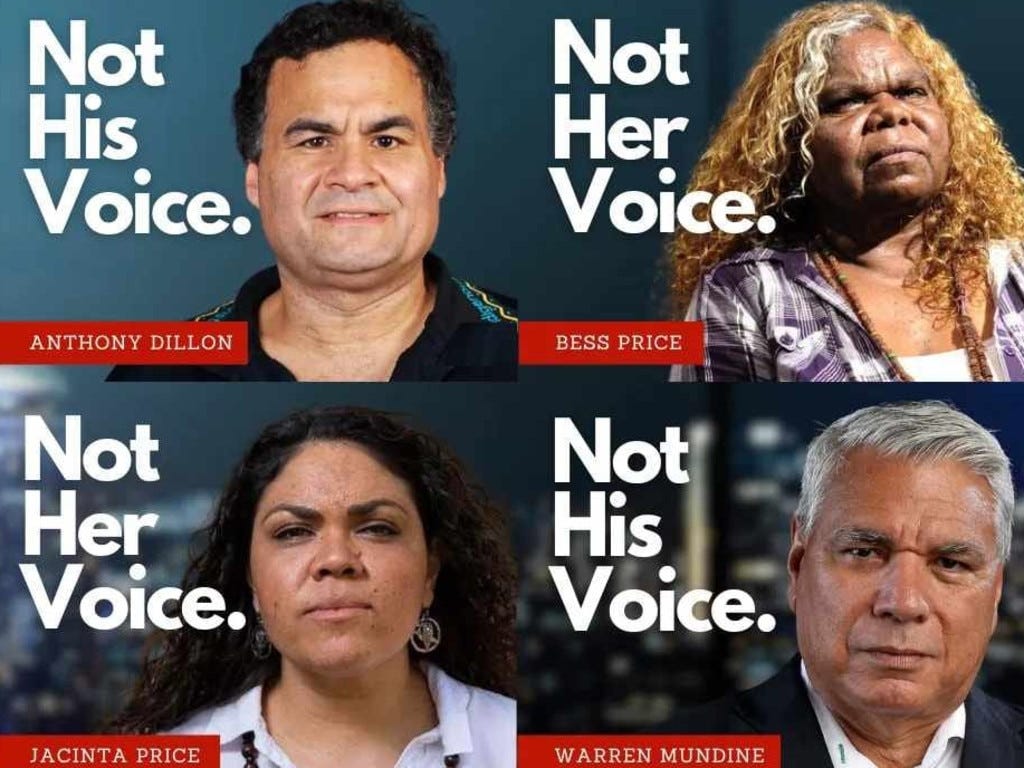As far as pivotal moments go in Australia’s history, in 15 days, Australia will decide the nation’s future.
The ‘Voice to Parliament’ referendum, whether Prime Minister Anthony Albanese or the Indigenous elite pushing an agenda, against the wishes of many of their own people, masked as a monumental period in Indigenous Australia, is wart riddled with suspicion.
The bifurcation surrounding the ‘Voice’ has now created a psychological schism in Australia.
And the mounting concern surrounding the ‘Yes’ vote will only add to the emotional trauma created as fear about the Yes" vote escalates.
This week’s Newspoll showed the collapse of the ‘Yes’ vote, and a growing belief amongst ‘No’ voters that the referendum could be a gateway for Indigenous elites to exploit their communities for personal gain, as a growing number of grassroots Aboriginal voices are also claiming.
A Productivity Commission report released recently reinforces the belief with the level of spending in 2016 to be $33.4 billion across all services from Federal, State and Territory governments.
The Federal portion was $117 billion.
With that amount of funding, it’s fair to expect the lives of remote and regional Indigenous Australians to have advanced significantly - and yet it seems no Indigenous communities have enjoyed any meaningful benefit.
Why are Indigenous communities as impoverished as ever, or worse, going backwards?
It’s a question Indigenous leaders running those programs and services need to answer.
Without accountability, the temptation to help improve one’s own personal circumstances always beckons, and that depends on individual morality.
So, why haven’t governments sought to inquire into why Indigenous Australians living in remote and regional Australia continue to live in poverty?
Where are the billions of dollars going and to whom, how and why would the ‘Voice’ make any difference to Indigenous Australians, both the remote communities in desperate poverty and hardship, the urban communities whose young people have ready access to many negative influences and the Indigenous elites who enjoy academic and bureaucratic tenure?
Until the answers are forthcoming, a ‘No’ vote is critically important to safeguard Indigenous Australians and stop them from being used as ‘cash cows’ by a select few.
While the’ Voice’ has garnered significant support, dissenting voices, including leading Indigenous Australians, sceptical about the true intent of what motives are behind the ‘Voice’, continue to express serious concerns about the potential consequences of what a ‘Yes’ vote means.
The prospect of Indigenous elites gaining more disproportionate power and influence within the proposed Indigenous representative body is a concern.
Should it happen, it could result in various quarters of the Indigenous elites exploiting their positions to divert resources, government funding, and economic opportunities away from the broader Indigenous community.
If as has been with billions already pumped into existing Indigenous programs for little or no benefit, then the ‘Yes’ vote could be seen as a vehicle for a select group of Indigenous leaders to siphon off resources and economic benefits intended to improve the lives of Indigenous communities.
Instead of addressing systemic inequalities, the fear now is the referendum could inadvertently exacerbate them by concentrating power in the hands of a privileged few.
The ‘YES’ vote argues it’s a call for a more equitable and inclusive approach and advocates for strengthening existing mechanisms of consultation and engagement with Indigenous communities, ensuring that decisions and resources benefit all members of these communities rather than a select elite.
In contrast, the ‘NO’ vote argues a more streamlined approach, focusing on targeted policies addressing education, employment, healthcare, and economic development, would be a more effective means of closing the economic gap between Indigenous and non-Indigenous Australians.
The establishment of a separate political entity could create power struggles and internal conflicts among different Indigenous groups and undermine the unity necessary to address pressing issues effectively.
The upcoming referendum will have profound implications for Indigenous empowerment and economic self-sufficiency.
The concerns raised about the "Yes" vote underscore the complex challenges and diverse perspectives within Indigenous communities and broader Australia.
With billions of dollars pumped into programs meant to improve the lives of Indigenous Australians and haven’t, except for the administrators in charge, the ‘Voice’ it seems will be more of the same, offer nothing new except for creating greater power and wealth to indigenous elites by exploiting Indigenous Australians they say they are representing.
An old and pithy line of wisdom is that “if you’re talking, you’re not listening” and most Australians, whatever their heritage, instinctively realise that adding more “voices” only makes listening harder. We have seen this in the systemic silencing and de-platforming of Indigenous people asking us to vote ‘NO’.
A ‘NO’ vote stops exploitation, keeps Australia unified, and buys more opportunities to listen to what the exploited need.





Well said Mr Altham
The billions of dollars already provided by the taxpayer doesn’t seem to have impacted one zac where it is needed, in the regional and remote areas. Oh, actually it doesn’t seem to have improved the lives in urban communities either. The only improvement seems to have been for the indigenous elites.
ACCOUNTABILITY please.
TRANSPARENCY please.
HONESTY please.
PLAN please.
THEN ask me YES or NO.